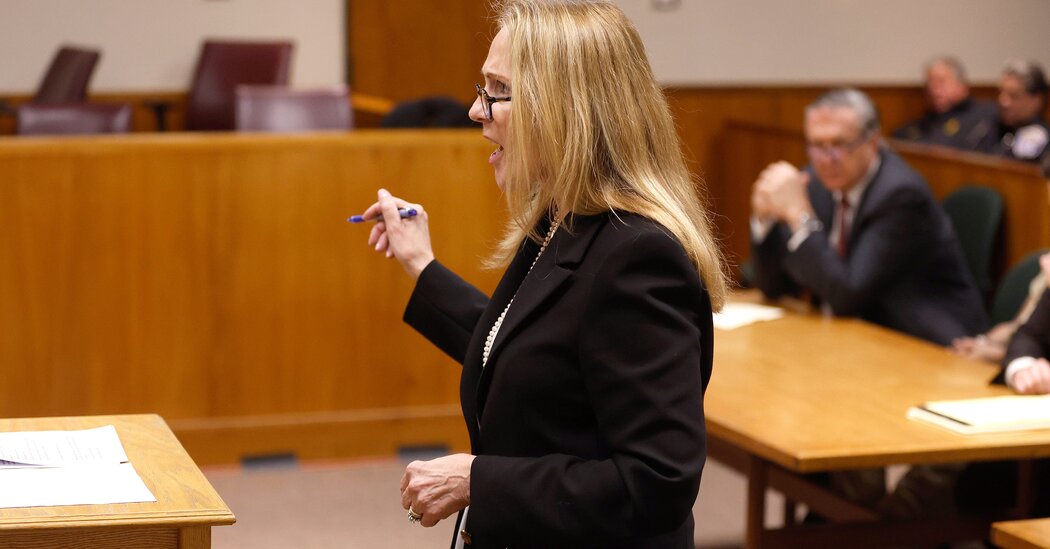It was 5:30 p.m. last Monday in Webster, N.Y., a Rochester suburb, when Police Officer Cameron Crisafulli noticed an S.U.V. being driven 20 miles per hour over the speed limit on Phillips Road.
Officer Crisafulli put on his lights and sirens, signaling to the driver to pull over. But the driver didn’t stop, steering the car into a residential neighborhood about a half mile up the road before pulling into the garage of a two-story white-clapboard house.
It was the home of Sandra Doorley, the Monroe County district attorney.
“Sorry, I’m the D.A. I was going 55 coming home from work,” Ms. Doorley said angrily, getting out of the car as Officer Crisafulli approached her garage. He reminded her that the speed limit on Phillips Road was 35 m.p.h. “I don’t really care,” she replied.
Footage of the encounter, recorded on Officer Crisafulli’s body camera and released Friday by the Webster Police Department, raised questions about whether Ms. Doorley had tried to use her office to avoid a traffic ticket. In the footage, Ms. Doorley can be heard using expletives, calling the officer vulgar names and repeatedly escalating the situation.
Another officer who arrived on the scene and identified himself as Officer Crisafulli’s supervisor told Ms. Doorley that by refusing to stop, she had broken another law, and that it was an arrestable offense. Ms. Doorley was not arrested.
The release of the footage led to a swift backlash, and residents of Rochester and beyond called for Ms. Doorley to face discipline.
In a statement on Sunday, Gov. Kathy Hochul said she had reported Ms. Doorley to the State Commission on Prosecutorial Conduct. The body camera footage, Ms. Hochul said, clearly showed Ms. Doorley “claiming she is above the law, attempting to use her public office to evade responsibility and acting unprofessionally towards a police officer simply trying to do his job.”
Ms. Doorley had “undermined her ability to hold others accountable for violating the law,” the governor said.
Save Rochester, a local advocacy group, has called for an investigation of Ms. Doorley and started a petition asking for her to be removed from office. At protests in Rochester on Monday, demonstrators from the group called for her to be disbarred.
The group is active in the Black Lives Matter movement and called for change following the death of Daniel Prude, a 41-year-old Black man, who died in police custody in Rochester 2020. Ms. Doorley faced calls for her resignation after deciding not to charge the police officers who had arrested Mr. Prude.
Activists with Save Rochester argued that the behavior of Ms. Doorley, who is white, during the traffic stop exemplified white privilege.
“This is proof that white privilege reigns supreme in our country and it’s time for that to come to an end,” the group wrote in a social media post. “Sandra put countless people’s lives in jeopardy and she had the nerve to try to use her position to escape justice, meanwhile she prosecutes Black people to the fullest extent of the law.”
While arguing with Officer Crisafulli after the traffic stop, the body camera footage showed, Ms. Doorley called the chief of police on the phone and asked him to tell the officer to leave her alone. At one point during the call, Ms. Doorley rolled her eyes and handed the phone to Officer Crisafulli, who explained the situation to the police chief, Dennis Kohlmeier.
“Just go away,” Ms. Doorley later said as she walked into her house.
Ms. Doorley apologized for her behavior in a video released on Sunday night, days after the body camera footage was made public.
“What I did was wrong, no excuses,” she said. “I didn’t treat this officer with the respect that he deserved.”
Both during her conversation with Officer Crisafulli and in her video, Ms. Doorley attributed her behavior to the stress of dealing with a recent spate of homicides in Rochester, where three murders occurred in less than two days this month.
“We all have bad days and stress, and it was wrong for me to take it out on an officer who’s simply doing his job,” she said.
In the video, Ms. Doorley added that she would pay the fine for her speeding ticket and would refer the episode to a district attorney from another county for review, though she did not specify which. Ms. Doorley also said that she was reporting the case to a grievance committee and pledged to take ethics training.
In her garage last week, Officer Crisafulli expressed confusion about the amount of hostility she was exhibiting toward him.
“I’m doing my job,” he told her. “You say you’re a D.A.?”
“I am the D.A.,” she replied, before getting her badge out of her handbag and showing it to him.
“If you give me a traffic ticket, that’s fine,” she said. “I’m the one who prosecutes it.”





